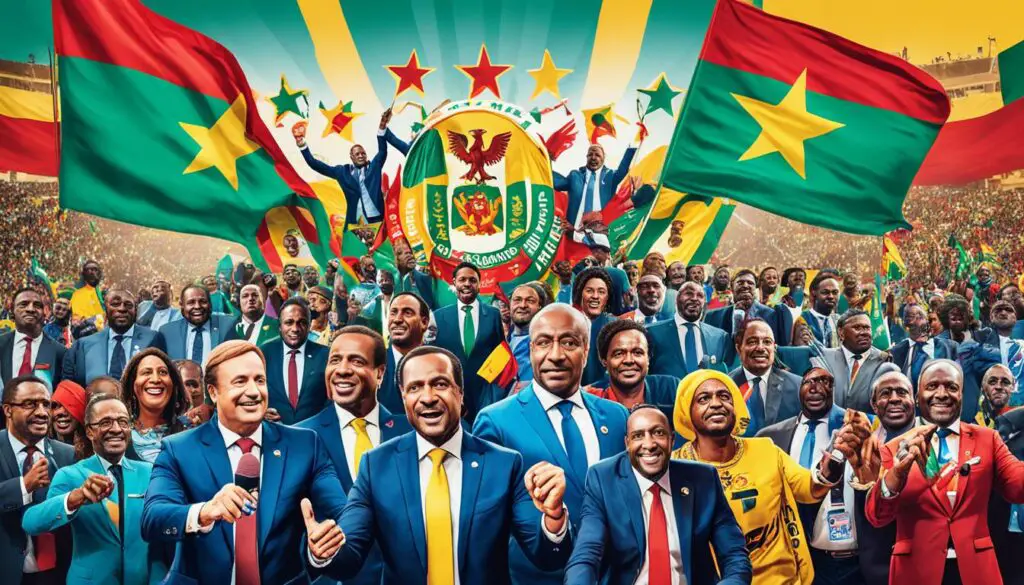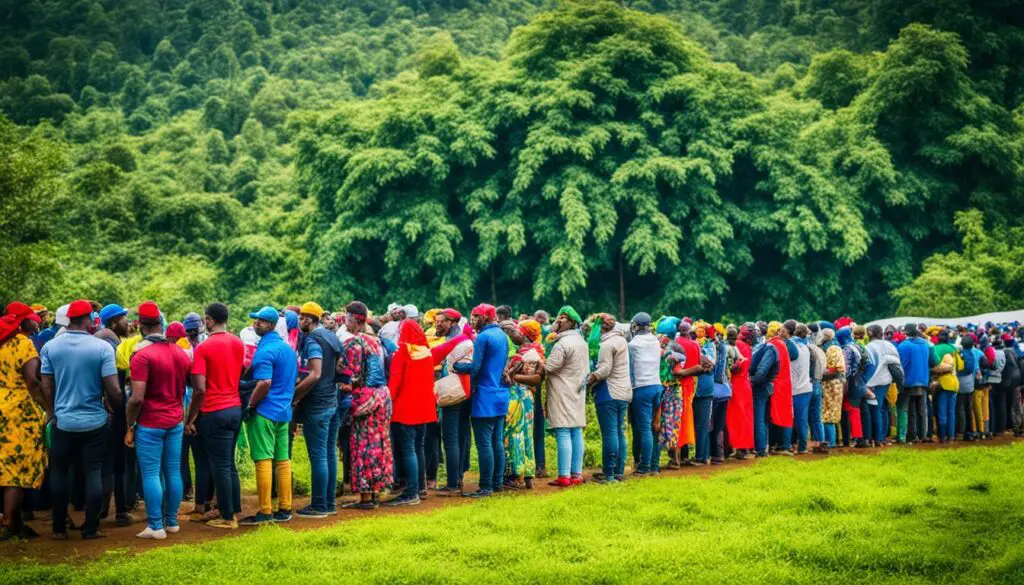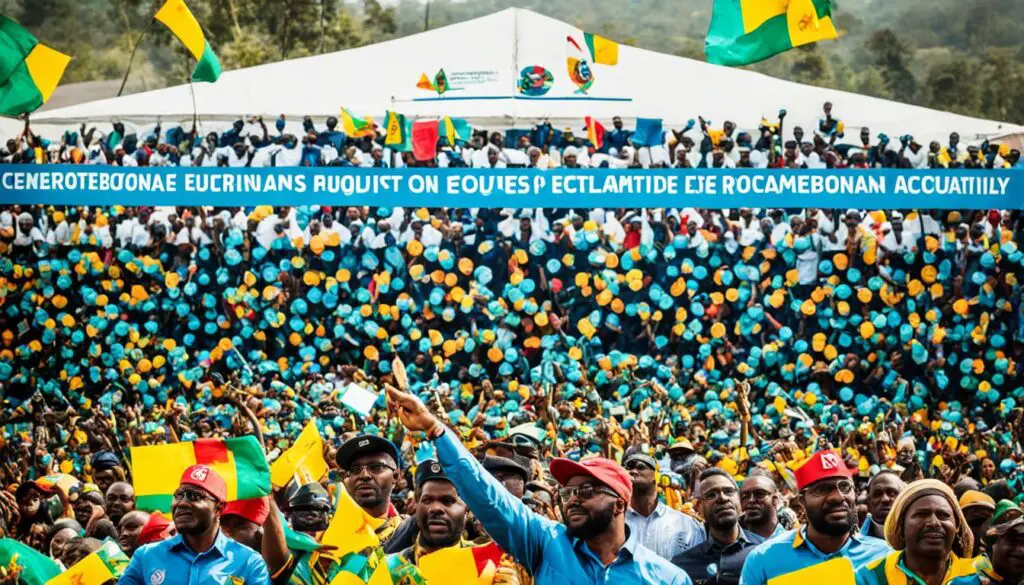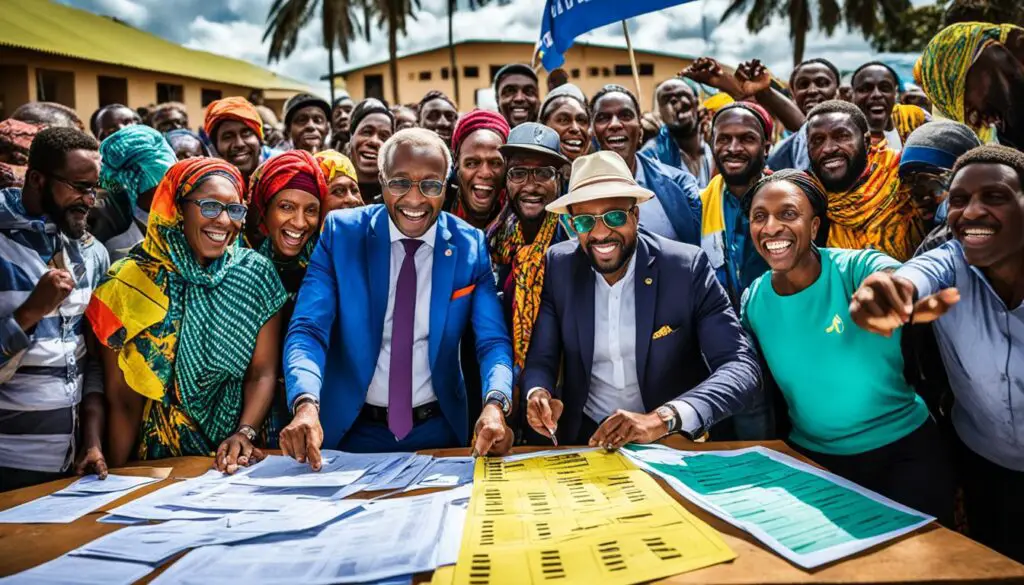Welcome to our comprehensive coverage of the 2025 Cameroon elections. In this article, we will provide you with the latest updates and valuable insights regarding this critical political event. As the election date approaches, it is crucial to stay informed about the candidates, issues, and possible outcomes that will shape the future of Cameroon.
With political landscapes constantly evolving, it becomes increasingly important to understand the key players, the election process, and the significant issues at stake. In addition, we will delve into international observers’ impact, voter turnout, election security, media coverage, and other pertinent aspects that influence the outcome of these elections.
To ensure a fair and transparent electoral process, it is vital for citizens to actively participate, engage in informative discussions, and make well-informed decisions about their future. We aim to provide you with valuable insights and analysis that will help you navigate through the complexities of the 2025 Cameroon elections.
Key Takeaways:
- Stay up to date with the latest updates and insights on the 2025 Cameroon elections.
- Understand the political landscape and the role of major political parties in Cameroon.
- Get to know the key candidates running in the 2025 elections and their political backgrounds.
- Gain insights into the election process in Cameroon, including voter registration and voting methods.
- Explore the major issues at stake in the 2025 Cameroon elections, such as the economy, security, infrastructure, and social welfare.
Cameroon’s Political Landscape
Understanding the political landscape is crucial when analyzing the upcoming Cameroon elections. The political parties involved play a significant role in shaping the country’s political future. Let’s take a closer look at the major political parties and their influence in these elections.
Major Political Parties
Several prominent political parties dominate the political scene in Cameroon. These parties represent different ideologies and have distinct policy priorities:
1. Cameroon People’s Democratic Movement (CPDM): As the ruling party, CPDM is a dominant force in Cameroon politics. Known for its center-right ideology, CPDM has strong support across various regions of the country.
2. Social Democratic Front (SDF): The main opposition party, SDF, represents the center-left ideology in Cameroon. It is known for its emphasis on social justice and grassroots mobilization.
3. Union des Populations du Cameroun (UPC): A historical party, UPC advocates for the defense of human rights, democracy, and egalitarianism. It is committed to promoting the interests of marginalized communities within Cameroon.
4. Movement for the Rebirth of Cameroon (MRC): A relatively new party, MRC aims to fight corruption, promote transparency, and create economic opportunities for all Cameroonians.
Role of Political Parties in the Elections
These political parties are not just vehicles for candidates but also have distinct roles in shaping the electoral landscape:
1. Candidate Selection: Political parties play a crucial role in selecting and endorsing candidates for the elections. This process ensures that party values and ideologies are represented in the electoral campaigns.
2. Campaigning and Mobilization: The political parties organize campaign rallies, door-to-door canvassing, and other grassroots efforts to mobilize voters and garner support for their candidates.
3. Policy Advocacy: Political parties use their platforms to advocate for specific policies and reforms that align with their ideologies and address the needs of their constituents.
4. Parliamentary Representation: Winning candidates from these parties will hold parliamentary seats, influencing policymaking and legislation in Cameroon.
Understanding the dynamics of Cameroon’s political landscape and the roles of different political parties is essential to grasp the potential outcomes of the upcoming elections and the impact they may have on the country’s future direction.
Key Candidates in the 2025 Elections
One of the most exciting aspects of the upcoming 2025 Cameroon elections is the diverse range of candidates vying for political office. These candidates come from various backgrounds and political parties, each with their own unique perspectives and visions for the future of Cameroon.
Let’s take a closer look at some of the key candidates who are likely to play a significant role in shaping the political landscape of Cameroon:
1. Michelle Ngoh
A renowned human rights activist, Michelle Ngoh has gained popularity among the masses for her unwavering fight against corruption and commitment to social justice. With a background in law, Ngoh is known for her persuasive speaking skills and ability to rally support from diverse sections of society.
2. Victor Ndam
Victor Ndam, a veteran politician with years of experience, has a strong reputation for his pragmatic approach to governance. As a former minister, Ndam possesses a deep understanding of the country’s administrative processes and has a track record of successful policy implementation.
3. Amina Bello
A young and dynamic leader, Amina Bello has captured the attention of many Cameroonians with her progressive ideas and innovative solutions. Bello’s focus on economic development, particularly in the technology and innovation sectors, has resonated with the youthful population of Cameroon.

4. Issa Fofana
Issa Fofana, a respected academic and intellectual, brings a wealth of knowledge and expertise to the political arena. With a background in economics, Fofana advocates for comprehensive strategies to combat poverty, promote sustainable development, and achieve economic stability.
5. Françoise Adele
Françoise Adele, a highly influential member of the political elite, has a long history in public service and has held several significant ministerial positions. Known for her charisma and strong leadership abilities, Adele focuses on policies aimed at improving education, healthcare, and infrastructure.
These are just a few examples of the candidates who are likely to shape the 2025 Cameroon elections. Each candidate brings a unique set of skills, experiences, and policy priorities to the table, making this election an exciting and crucial moment for the future of Cameroon.
Election Process in Cameroon
The election process in Cameroon is a crucial aspect of democratic governance, ensuring the fair representation of the citizens’ will. Understanding how elections are conducted is vital for both voters and participants in the political landscape. In this section, we will explore the key elements of the election process in Cameroon, including voter registration, voting methods, and the role of independent electoral bodies.
Voter Registration
Before participating in the elections, eligible individuals must first register as voters. The voter registration process in Cameroon is overseen by the Elections Cameroon (ELECAM), an independent electoral body responsible for maintaining accurate voter rolls. Each citizen is required to register at their respective local administrative offices, providing relevant identification documents such as a national identity card or a passport.
It is important to note that voter registration deadlines are announced well in advance, and citizens are encouraged to register within the designated period. By ensuring that citizens are registered to vote, the electoral process promotes inclusivity and ensures that every eligible individual has a voice in shaping the future of Cameroon.
Voting Methods
Cameroon employs a multi-modal voting system to ensure accessibility and accommodate different voter preferences. The primary voting method is through the use of paper ballots. On election day, designated polling stations are set up across the country for citizens to cast their votes.
For individuals with disabilities or those who require additional assistance, special provisions are made to facilitate their participation. These include accessible voting equipment and trained personnel to provide support, ensuring that no voter is left behind.
Role of Independent Electoral Bodies
The election process in Cameroon is overseen by independent electoral bodies to ensure transparency and impartiality. ELECAM plays a pivotal role in facilitating free and fair elections by organizing the entire electoral process, from voter registration to result tabulation.
Watchdogs such as the National Elections Observatory and civil society organizations also play an essential role in monitoring the electoral process, ensuring compliance with electoral laws and regulations. Their presence helps maintain the integrity of the elections and safeguards the democratic principles of the electoral process.

By understanding the election process in Cameroon, voters can actively participate in shaping their country’s future. From voter registration to the role of independent electoral bodies, every step of the process is vital in ensuring a democratic and inclusive electoral system.
Major Issues at Stake
In the 2025 Cameroon elections, several major issues will be at stake, shaping the country’s future policy priorities. These issues encompass a wide range of areas, including the economy, security, infrastructure, and social welfare. Addressing these issues effectively is crucial for the development and progress of Cameroon.
One of the key major issues is the economy. Cameroon faces the challenge of fostering economic growth and reducing unemployment rates. Policies that focus on job creation, investment in industries, and promoting entrepreneurship will be essential to stimulate economic development.
Ensuring security is another pressing concern. The country needs to tackle various security threats, including insurgency, terrorism, and conflicts in certain regions. Implementing effective security measures and strengthening law enforcement will be crucial for fostering a safe and stable environment for citizens.
Infrastructure development is also a significant issue in the upcoming elections. Improving infrastructure, such as transportation networks, energy systems, and telecommunications, is important for attracting investments and enhancing connectivity within the country.
Furthermore, social welfare is a critical policy priority. Addressing issues related to healthcare, education, and social security will be essential to improve the overall well-being and quality of life for the people of Cameroon.
As the 2025 Cameroon elections approach, it is essential for political leaders to prioritize and address these major issues effectively to ensure a prosperous and sustainable future for the country. By electing leaders who champion policies that tackle these challenges head-on, Cameroon can build a brighter future for its citizens.

International Observers and Impact
International observers play a crucial role in ensuring the transparency and fairness of the Cameroon elections. Their presence helps uphold democratic principles and provides valuable insights into the electoral process. These observers, representing various international organizations and countries, closely monitor the elections, assess their credibility, and report on any irregularities.
Understanding the Role of International Observers
International observers act as impartial monitors, observing both pre-election preparations and the voting process itself. They assess various aspects, including voter registration, campaigning, media coverage, and the conduct of political parties. The presence of international observers serves to instill public confidence in the legitimacy of the election.

Their reports and assessments provide valuable feedback to the electoral authorities, highlighting areas of improvement and potential challenges. This feedback can help enhance future electoral processes and strengthen democratic institutions in Cameroon.
The Impact on Global Politics
The outcome of the Cameroon elections can have a significant impact on global politics, shaping diplomatic relations and regional dynamics. The international community closely observes the electoral process to gauge the country’s commitment to democratic governance and political stability.
The election results may influence regional alliances, cooperation, and trade relations, as countries consider aligning themselves with a politically stable Cameroon. Furthermore, the policy priorities and positions of the incoming government may have ramifications for international cooperation in areas such as security, trade, and development.
The involvement of international observers further emphasizes the interconnectedness of global politics and the recognition of the importance of fair elections. Their presence sends a powerful message that democratic values should be upheld, fostering a globally inclusive and democratic system.
Overall, international observers play a critical role in ensuring transparent and credible elections in Cameroon. Their impact extends beyond national boundaries, contributing to the promotion of democracy and stability in the region and beyond.
Voter Turnout and Engagement
The success of any election depends heavily on voter turnout and engagement. In the upcoming Cameroon elections, it is crucial for citizens to actively participate and exercise their right to vote. High voter turnout not only strengthens the democratic process but also ensures that elected officials truly represent the will and interests of the people.
Encouraging voter participation requires strategic efforts to engage and educate the electorate. One strategy is to launch voter education campaigns that provide clear and accessible information about the election process, candidate profiles, and policy positions. This empowers voters to make informed decisions, leading to a more engaged and knowledgeable electorate.

Additionally, fostering a sense of civic duty and community can enhance voter engagement. By emphasizing the importance of active citizenship, individuals are more likely to prioritize voting and participate in other civic activities. This can be achieved through partnerships with community organizations, schools, and local leaders to promote civic education and involvement.
Furthermore, leveraging technology and digital platforms can broaden the reach of voter engagement initiatives. Social media campaigns, online voter registration, and election information portals can facilitate access to information and simplify the registration process. This appeals especially to younger voters who are generally more tech-savvy.
In conclusion, voter turnout and engagement are essential components of a robust and representative democratic system. By implementing effective strategies to encourage participation and promote civic awareness, the Cameroon elections can achieve a more inclusive and impactful outcome that truly reflects the voices and aspirations of the nation.
Election Security and Challenges
In the context of the upcoming 2025 Cameroon elections, ensuring election security and addressing the challenges that come with it is of utmost importance. Fair and transparent electoral processes are the foundation of any democratic nation, and Cameroon is no exception.
However, the pursuit of election security is not without its obstacles. One major challenge faced by election authorities is the prevention of voter fraud and manipulation. Cybersecurity threats and technological vulnerabilities pose significant risks to the integrity of the electoral process. It is crucial to implement robust security measures to safeguard against these threats and protect the sanctity of the elections.
Additionally, there are logistical challenges involved in conducting free and fair elections. Adequate infrastructure, sufficient resources, and well-trained poll workers are essential for smooth functioning of polling stations and accurate vote counting. Addressing these logistical challenges is crucial to maintaining public trust in the electoral process.
The presence of political violence and intimidation is another significant concern during elections. Ensuring the safety and security of voters, candidates, and election officials is imperative to promote an environment conducive to free and fair elections. Measures must be taken to prevent any form of violence or harassment that could influence the outcomes of the elections.
Efforts to address these challenges require a collaborative approach involving election authorities, government institutions, civil society organizations, and international partners. By working together, they can develop comprehensive strategies to mitigate risks and ensure that the electoral process upholds the principles of democracy and fairness.
The Role of Election Observation:
Election observation plays a vital role in enhancing election security and transparency. Independent domestic and international election observers monitor the various stages of the electoral process, including voter registration, campaign activities, voting, and vote counting. Their presence helps ensure accountability and promotes public confidence in the elections.
International observer missions, such as those deployed by the African Union, the United Nations, and regional organizations, provide valuable insight and recommendations for improving the election process. Their assessments help identify areas of improvement and contribute to the overall integrity of the electoral process.
To address election security challenges effectively, it is crucial to acknowledge and tackle the specific issues faced in the Cameroon context. By prioritizing election security and working towards overcoming these challenges, Cameroon can establish a strong foundation for credible and democratic elections that truly represent the will of the people.
Media Coverage and Information Accessibility
In the digital age, media coverage plays a crucial role in shaping public opinion and influencing voter decisions. As we approach the 2025 Cameroon elections, it is essential to examine the impact of media coverage on the electoral process and the overall accessibility of information for voters.
Media coverage:
Media outlets, including traditional news sources and online platforms, have the power to shape the narrative surrounding political events. Their coverage can influence public perception, highlight candidates’ policy proposals, and provide analysis of the political landscape.
During the Cameroon elections, media coverage will be instrumental in keeping voters informed about candidate profiles, campaign strategies, and major issues at stake. It will provide a platform for candidates to communicate their vision, policy priorities, and engage directly with the electorate.
Information accessibility:
However, media coverage alone is not sufficient to ensure an informed electorate. It is equally important to address the issue of information accessibility, ensuring that all voters have access to reliable and accurate information.
Voters need easy access to comprehensive information about the electoral process, candidate profiles, and the key issues debated during the campaign. This includes information in various formats and languages, accessible to individuals with different levels of internet connectivity and digital literacy.
Efforts should be made to enhance information accessibility through voter education programs, civic engagement initiatives, and collaborations with local communities. By promoting transparency and information sharing, we can empower voters to make informed decisions that align with their values and priorities.
The image above represents the diverse media landscape that influences the Cameroon elections.
Regional Implications and Cameroon’s Position
The 2025 Cameroon elections hold not only national significance but also important regional implications. As a key player in Africa, Cameroon’s position within regional political alliances could be greatly impacted by the election outcomes. Political alliances and regional cooperation are crucial in addressing shared challenges and promoting regional stability and progress.
Cameroon’s role within regional political alliances, such as the African Union and the Economic Community of Central African States, influences its standing and influence among neighboring countries. The election results will shape Cameroon’s position within these alliances and may have a considerable impact on regional dynamics.
Furthermore, the regional implications of the Cameroon elections extend beyond political considerations. They can influence economic cooperation, trade relationships, and regional development initiatives. Positive election outcomes can foster increased regional collaboration, while instability or controversial results could strain diplomatic ties and hinder regional progress.
It is essential for international observers and regional partners to closely monitor the Cameroon elections, foster transparent and accountable processes, and support peaceful transitions of power. By doing so, they can contribute to the stability and prosperity of the region as a whole, while also respecting the sovereignty and democratic rights of the Cameroonian people.
The intricate interplay of regional implications, Cameroon’s position, and political alliances underscores the significance of the 2025 elections beyond the national borders. The outcomes will shape not only Cameroon’s political landscape but also have broader repercussions in Africa and the international community.
Conclusion
As we conclude our analysis of the 2025 Cameroon elections, it is evident that staying informed about this significant political event is crucial. The insights gained from exploring the political landscape, key candidates, election process, major issues, international observers, voter engagement, election security, media coverage, regional implications, and Cameroon’s position have shed light on the importance of this democratic process.
The Cameroon elections serve as a platform for citizens to shape their country’s future by electing leaders who will address pressing policy priorities. Whether it be the economy, security, infrastructure, or social welfare, the choices made during these elections will have a direct impact on the lives of Cameroonian citizens.
It is essential for voters to engage actively in the electoral process and make informed choices. By staying informed about the candidates’ backgrounds, campaigns, and policy proposals, voters can contribute to a prosperous and stable future for Cameroon. Additionally, the role of international observers and the media in ensuring a fair and transparent electoral process cannot be understated. Their presence and unbiased reporting play a crucial role in upholding democratic principles.
In conclusion, the 2025 Cameroon elections provide a unique opportunity for citizens to shape the country’s trajectory. By actively participating, staying informed, and making well-informed decisions, voters can contribute to a prosperous and inclusive Cameroon for all. Let us embrace the insights gained from this analysis and recognize the power of our voices in shaping the future of our nation.
FAQ
What are the Cameroon elections of 2025?
The Cameroon elections of 2025 refer to the upcoming political event in which Cameroonians will cast their votes to elect their leaders.
What is the political landscape in Cameroon?
The political landscape in Cameroon encompasses various political parties that play a significant role in shaping the country’s governance.
Who are the key candidates in the 2025 elections?
The 2025 Cameroon elections will witness several key candidates, each representing different political ideologies, vying for positions of power.
How does the election process work in Cameroon?
The election process in Cameroon involves various stages, including voter registration, voting methods, and the involvement of independent electoral bodies.
What are the major issues at stake in the 2025 Cameroon elections?
The 2025 Cameroon elections will address critical issues such as the economy, security, infrastructure, and social welfare, shaping the country’s policy priorities.
What is the role of international observers in the Cameroon elections?
International observers play a crucial role in ensuring transparency and fairness in the Cameroon elections, monitoring the process and reporting any irregularities.
Why is voter turnout and engagement important in the Cameroon elections?
High voter turnout and engagement are essential for the legitimacy and democratic functioning of the Cameroon elections, reflecting the active participation of citizens in shaping their country’s future.
What are the challenges faced in ensuring election security?
Ensuring election security in Cameroon is a complex task, with challenges such as preventing voter intimidation, ensuring impartiality, and safeguarding the integrity of the electoral process.
What is the role of media coverage in the Cameroon elections?
Media coverage plays a significant role in providing information and analysis to the public, helping voters make informed decisions and fostering transparency in the electoral process.
What are the regional implications of the Cameroon elections?
The outcome of the Cameroon elections can have regional implications, potentially influencing Cameroon’s position within regional political alliances and shaping regional dynamics.